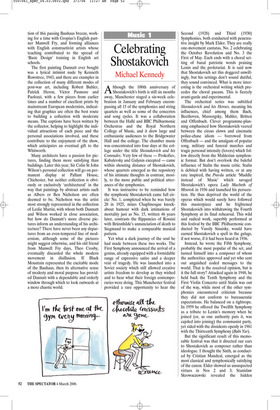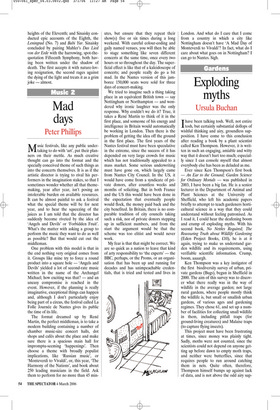Celebrating Shostakovich
Michael Kennedy
Although the 100th anniversary of Shostakovich’s birth is still six months away, Manchester staged a six-week celebration in January and February encompassing all 15 of the symphonies and string quartets as well as some of the concertos and song cycles. It was a collaboration between the Hallé and BBC Philharmonic Orchestras and the Royal Northern College of Music, and it drew large and enthusiastic audiences to the Bridgewater Hall and the college. The chamber music was concentrated into four days at the college under the title Shostakovich and his Comrades. Very few of these — Prokofiev, Kabalevsky and Galynin excepted — came within shouting distance of Shostakovich, whose quartets emerged as the repository of his intimate thoughts in contrast, mostly, to the more public and political utterances of the symphonies.
It was instructive to be reminded how the symphonic Shostakovich came full circle: No. 1, completed when he was barely 20 in 1925, mixes Chaplinesque knockabout humour with dark intimations of mortality just as No. 15, written 46 years later, contrasts the flippancies of Rossini with Brünnhilde’s annunciation of death to Siegmund to make a comparable musical pattern.
Yet what a dark journey of the soul he had made between these two works. The First Symphony announced the arrival of a genius, already equipped with a formidable range of expressive satire and a deeper vein of tragedy. He was launched into a Soviet society which still allowed creative artists freedom to develop as they wished and to hear what their foreign contemporaries were doing. This Manchester festival provided a rare opportunity to hear the Second (1928) and Third (1930) Symphonies, both conducted with penetrative insight by Mark Elder. They are really one-movement cantatas, No. 2 celebrating the October Revolution and No. 3 the First of May. Each ends with a choral setting of banal patriotic words praising Lenin and the proletariat. It is said now that Shostakovich set this doggerel unwillingly, but his settings don’t sound dutiful, they sound convinced. What is more interesting is the orchestral writing which precedes the choral paeans. This is fiercely avant-garde and experimental.
The orchestral series was subtitled Shostakovich and his Heroes, meaning his influences, chief among them Bach, Beethoven, Mussorgsky, Mahler, Britten and Offenbach. Clever programme-planning emphasised how Shostakovich veered between the circus clown and cinematic police-chase idiom — borrowed from Offenbach — and the amalgam of popular song, military and funeral marches and tragic personal intensity (lovers) which follow directly from the Mahlerian symphonic format. But don’t overlook the baleful influence of Stalin the music critic. Stalin is debited with having written, or at any rate inspired, the Pravda article ‘Muddle instead of Music’ which savaged Shostakovich’s opera Lady Macbeth of Mtsensk in 1936 and launched his persecution. He thus deprived the world of the operas which would surely have followed this masterpiece and he frightened Shostakovich into withdrawing the Fourth Symphony at its final rehearsal. This wild and radical work, superbly performed at this festival by the BBC Philharmonic conducted by Vassily Sinaisky, would have earned Shostakovich a spell in the gulags, if not worse, if it had been heard in 1936.
Instead, he wrote the Fifth Symphony, probably the most popular of the set, and turned himself into a composer of whom the authorities approved and yet who sent out anguished coded messages to the world. That is the received opinion, but is it the full story? Attacked again in 1948, he held back the Tenth Symphony and the First Violin Concerto until Stalin was out of the way, while most of the other symphonies encountered criticism because they did not conform to bureaucratic expectations. He balanced on a tightrope. In 1959 he offered the Twelfth Symphony as a tribute to Lenin’s memory when he joined (or, as one authority puts it, was cajoled into joining) the communist party, yet sided with the dissidents openly in 1961 with the Thirteenth Symphony (Babi Yar).
But the significant result of this memorable festival was that it directed our ears to Shostakovich as composer rather than ideologue. I thought the Sixth, as conducted by Cristian Mandeal, emerged as the most classical and symphonically satisfying of the canon. Elder showed us unsuspected virtues in Nos 2 and 3; Stanislaw Skrowaczewski revealed the hidden heights of the Eleventh; and Sinaisky conducted epic accounts of the Eighth, the Leningrad (No. 7) and Babi Yar. Sinaisky concluded by pairing Mahler’s Das Lied von der Erde with the harrowing, spot-thequotation Fifteenth Symphony, both having been written under the shadow of death. The first accepts it with nature-loving resignation, the second rages against the dying of the light and treats it as a grim joke — almost.











































































 Previous page
Previous page